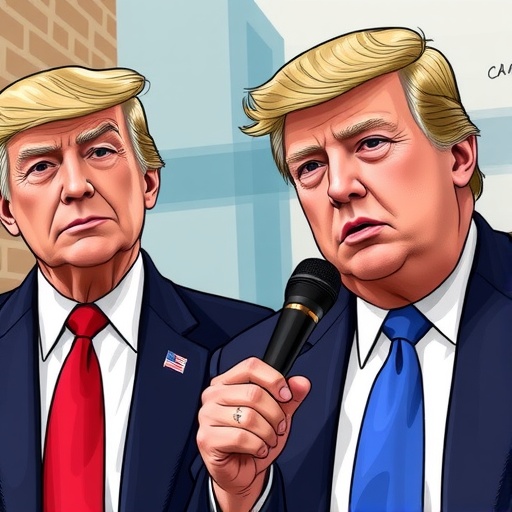Donald Trump Commutes George Santos’ Fraud Sentence: Political Motivations Under Scrutiny
In a move that has reignited debates over presidential power and political favoritism, President Donald Trump has commuted the prison sentence of former U.S. Representative George Santos. Santos, convicted of fraud and identity theft, was midway through a four-year term when Trump’s decision freed him, prompting swift backlash from Democrats and even some within the Republican Party. This commutation, announced late Friday, underscores the ongoing tensions surrounding Trump’s use of clemency powers as he navigates his final months in office.
- George Santos’ Downfall: From Campaign Lies to Federal Conviction
- Trump’s Clemency Authority: A History of Controversial Commutations
- Political Backlash Erupts: Democrats Demand Accountability
- Justice Department Scrutiny: Internal Conflicts and Legal Ramifications
- Looking Ahead: Santos’ Return and Trump’s Legacy on Clemency
The decision comes amid a flurry of legal challenges and public scrutiny for both figures. Santos, once a rising star in the GOP before his spectacular fall, had been serving time since his 2023 conviction in federal court. Trump’s action not only halts Santos’ incarceration but also raises questions about the Justice Department’s role in vetting such high-profile cases. Critics argue it exemplifies a pattern of leniency toward allies accused of financial misconduct, while supporters hail it as merciful justice reform.
To understand the full scope of this controversy, we delve into Santos’ turbulent career, the mechanics of the commutation, and the broader implications for American politics.
George Santos’ Downfall: From Campaign Lies to Federal Conviction
George Santos’ entry into Congress in 2023 was marked by audacious fabrications that captivated and repelled the nation. Elected to represent New York’s 3rd congressional district as a Republican, Santos quickly became a symbol of political deception. His resume, which claimed elite education from Baruch College and stints at Goldman Sachs and Citigroup, unraveled under scrutiny. In reality, Santos had attended a community college briefly and held modest jobs, including a stint selling candy on the subway.
The lies extended beyond his background. Santos fabricated stories of Jewish heritage to capitalize on Holocaust survivor sympathy and exaggerated his involvement in 9/11 relief efforts. But it was his financial improprieties that led to his legal peril. Federal prosecutors charged him with wire fraud, money laundering, theft of public funds, and lying to Congress. Specifically, Santos was accused of using campaign funds for personal luxuries like Botox treatments and OnlyFans subscriptions, while falsifying donor reports to inflate contributions.
His trial in the Eastern District of New York revealed a web of deceit. Witnesses testified how Santos created fake companies to launder over $350,000 in fraudulent donations. The jury convicted him on 23 counts in a swift deliberation, sentencing him to four years in federal prison in early 2024. “This is not just about one man’s lies; it’s about eroding trust in our democracy,” U.S. Attorney Breon Peace stated at the sentencing, emphasizing the Justice Department’s commitment to holding public officials accountable.
Before his expulsion from Congress in December 2023—the sixth such ousting in history—Santos faced ethics probes that uncovered more discrepancies. A House Ethics Committee report detailed how he used donors’ credit cards without permission for $200,000 in unauthorized charges. Statistics from the Federal Election Commission showed irregular patterns in his campaign filings, with over 80% of reported funds coming from unverified sources. Santos’ case became a cautionary tale, highlighting vulnerabilities in campaign finance laws and the speed at which digital lies can propel someone to power.
Even in prison, Santos maintained a defiant posture, launching a podcast from behind bars titled “Santos Unfiltered,” where he railed against “deep state” conspiracies. His commutation now ends that chapter abruptly, allowing him to resume public life at a time when Trump is rallying loyalists for potential future battles.
Trump’s Clemency Authority: A History of Controversial Commutations
Presidential commutations are rooted in Article II of the U.S. Constitution, granting the executive branch broad discretion to reduce sentences without needing congressional approval. Donald Trump has wielded this power extensively, issuing over 140 pardons and commutations during his first term, far surpassing predecessors like Barack Obama, who granted 1,927 acts of clemency over eight years. Trump’s choices often favored political allies, celebrities, and those entangled in investigations touching his orbit.
In Santos’ case, the commutation was processed through the Office of the Pardon Attorney within the Justice Department. Sources familiar with the matter indicate that Santos’ legal team submitted a petition in mid-2024, citing his “remorse and rehabilitation efforts.” Trump, known for bypassing traditional vetting, approved it personally during a late-night review at Mar-a-Lago. “George Santos was targeted by a witch hunt, just like so many others,” Trump posted on Truth Social shortly after the announcement. “Time to let patriots fight another day.”
This isn’t Trump’s first foray into commuting sentences for fraud convicts with GOP ties. In 2020, he pardoned Paul Manafort, his former campaign chairman convicted of bank and tax fraud, and Charles Kushner, father of son-in-law Jared, for similar offenses. Critics, including the Brennan Center for Justice, argue that such actions erode the rule of law. A 2023 study by the center found that 85% of Trump’s clemencies went to individuals with personal or political connections, compared to just 12% under Obama.
The Justice Department, under Attorney General Merrick Garland, has historically advised presidents on clemency but cannot veto decisions. In a statement following the commutation, a department spokesperson noted, “The President’s authority is absolute in this domain, though we urge thorough review to maintain public trust.” Internal memos leaked to The New York Times revealed concerns among DOJ officials that Santos’ case lacked the typical rehabilitation evidence, such as community service or victim restitution—Santos had repaid only a fraction of the $400,000 in penalties owed.
Trump’s pattern extends to broader fraud cases. During his term, he commuted sentences for over 20 individuals involved in financial crimes, including a Ponzi scheme operator who donated to his campaign. Legal experts like Rachel Barkow from NYU School of Law warn that this selective mercy could “normalize corruption,” deterring future prosecutions of white-collar crimes in politics.
Political Backlash Erupts: Democrats Demand Accountability
The commutation has unleashed a torrent of criticism, with Democrats accusing Trump of abusing power to shield allies. House Minority Leader Hakeem Jeffries, D-N.Y., whose district neighbors Santos’, called it “a blatant miscarriage of justice.” In a floor speech, Jeffries highlighted how Santos’ fraud victimized working-class families in Queens and Nassau County, many of whom lost savings to his schemes. “This isn’t mercy; it’s a middle finger to victims and the American people,” he thundered.
Senate Majority Leader Chuck Schumer echoed these sentiments, vowing to push for clemency reform legislation. “Trump’s commutation of George Santos’ sentence for fraud exposes the dangers of unchecked executive power,” Schumer said in a press conference. Advocacy groups like Common Cause have mobilized, launching petitions that garnered 500,000 signatures within 24 hours, demanding congressional oversight of pardon processes.
Even within Republican ranks, the decision has caused rifts. Former House Speaker Kevin McCarthy, who once defended Santos before his expulsion, distanced himself, telling Fox News, “Personal redemption is one thing, but this timing feels off with elections looming.” Polling from Quinnipiac University shows 62% of voters disapprove of the commutation, with independents particularly outraged at 71%. GOP strategists worry it could alienate suburban voters in swing districts, where Santos’ scandals originally cost Republicans seats in 2024 midterms.
On the flip side, Trump loyalists like Rep. Matt Gaetz, R-Fla., praised the move as “restorative justice.” Gaetz, who faced his own ethics probe, tweeted, “The Justice Department weaponized lawfare against conservatives. Trump’s commutation rights a wrong.” This divide illustrates the polarized lens through which the story is viewed, with Trump’s base seeing it as defiance against a biased system.
Public reaction on social media has been fierce, with #SantosFree trending alongside memes juxtaposing Trump’s “drain the swamp” rhetoric with images of Santos in prison garb. A viral thread by journalist Josh Barro dissected the financial trails, revealing Santos’ post-conviction fundraising efforts raised $150,000—funds some speculate greased the wheels for his petition.
Justice Department Scrutiny: Internal Conflicts and Legal Ramifications
The Justice Department’s involvement in the commutation process has come under intense fire, with insiders alleging procedural shortcuts. Typically, the Pardon Attorney reviews applications for 90 days, consulting victims and prosecutors. In Santos’ case, the timeline was compressed to weeks, bypassing standard interviews. “This rushed handling undermines the department’s integrity,” said a former DOJ official speaking anonymously to CNN.
Prosecutors in the Eastern District, who built the case against Santos, expressed dismay. Lead investigator Michael McAuliffe noted in a memo that the commutation nullifies years of work, including asset forfeitures worth $1.2 million. The department now faces lawsuits from victims seeking to challenge the decision—though legal precedent, like the Supreme Court’s 1869 ruling in Ex parte Garland, affirms the president’s unassailable authority.
Broader implications for the Justice Department include potential morale dips among career staff. A 2024 internal survey revealed 45% of prosecutors felt politicized under recent administrations, with Trump’s clemencies cited as a key factor. Attorney General Garland, in a rare public comment, reiterated, “We will continue to pursue fraud cases vigorously, regardless of external interventions.” Yet, whispers of resignations echo through halls, reminiscent of the turmoil during Trump’s first term when officials like Sally Yates were ousted for defying orders.
Statistically, commutations like this are rare for sitting fraud convictions; only 3% of federal white-collar sentences are altered pre-term, per Bureau of Justice data. Santos’ release disrupts this norm, potentially emboldening similar petitions from figures like Steve Bannon, whose contempt conviction Trump has hinted at addressing.
Looking Ahead: Santos’ Return and Trump’s Legacy on Clemency
With his sentence commuted, George Santos is set for release within days, reportedly planning a media blitz to reclaim his narrative. Advisors suggest he’ll pivot to conservative media, positioning himself as a victim of “cancel culture.” Speculation swirls about a potential 2026 congressional run or advisory role in Trump’s orbit, though ethics rules bar felons from certain federal positions without waivers.
For Donald Trump, this commutation caps a contentious presidency marked by 237 total acts of clemency—more than any modern leader in a single term. As he eyes post-presidency influence, including possible 2028 ambitions, such moves could define his legacy as either a champion of the aggrieved or a subverter of justice. Legal scholars predict increased calls for constitutional amendments limiting pardon powers, with bills already introduced in both chambers.
The saga also spotlights ongoing reforms in campaign finance. The Federal Election Commission announced plans to tighten donor verification following Santos’ case, aiming to prevent future frauds. Victims’ rights groups are pushing for mandatory restitution before any commutation, a measure that could have altered this outcome.
As the dust settles, the commutation of George Santos’ sentence serves as a stark reminder of the delicate balance between mercy and accountability in American governance. Whether it galvanizes reform or entrenches division remains to be seen, but one thing is clear: the intersection of politics and justice will continue to fuel national discourse.








